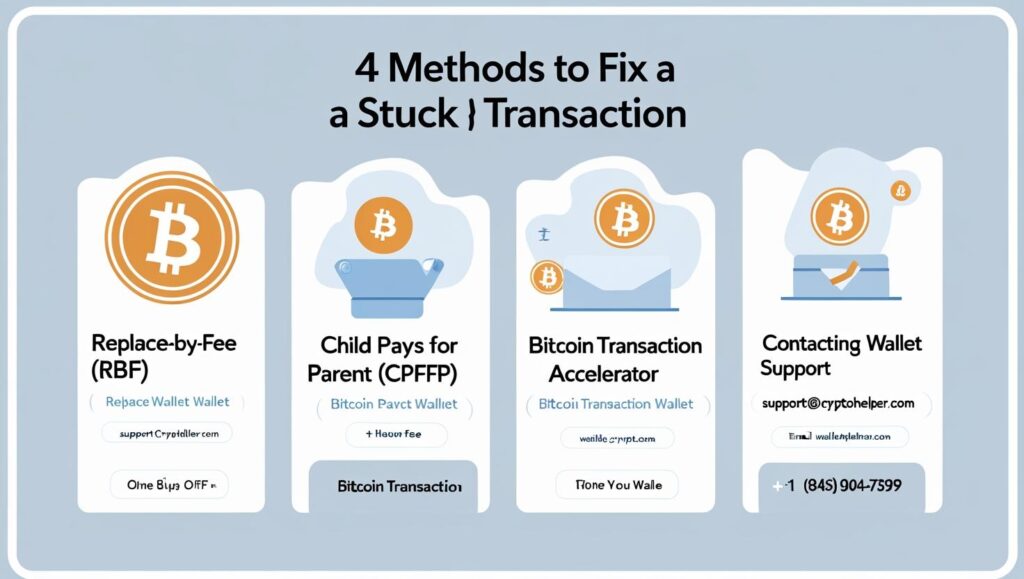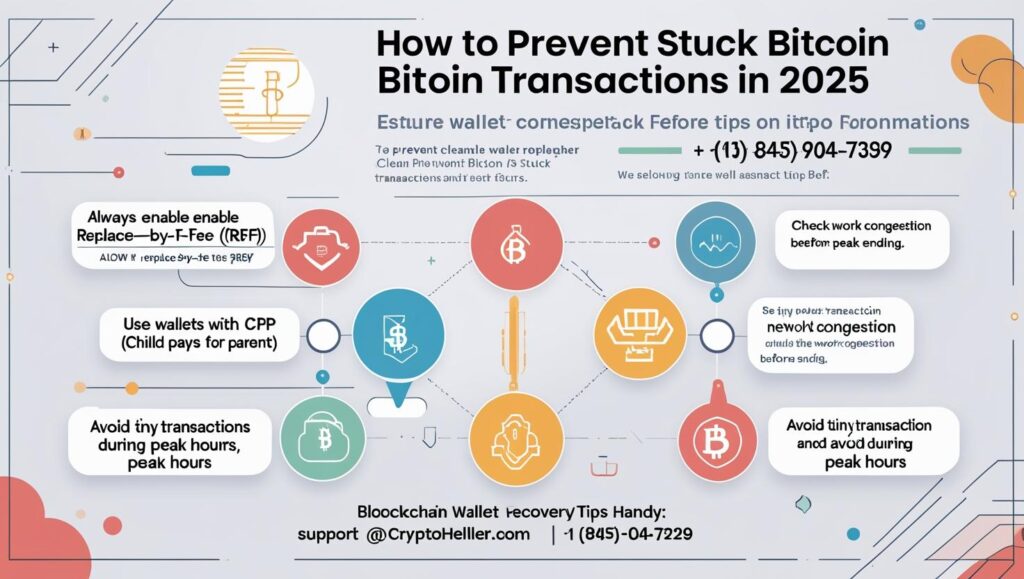1. Introduction: Why Bitcoin Transactions Get Stuck (and How to Fix Them)
You’ve just sent Bitcoin, expecting it to confirm in minutes, but instead, it’s sitting there—unconfirmed, seemingly frozen in the blockchain. Sound familiar? A bitcoin transaction stuck is one of the most common frustrations crypto users face, whether you’re sending funds to an exchange, paying for services, or simply moving assets between wallets.
The good news? Your Bitcoin isn’t lost. In most cases, a stuck transaction is temporary and fixable. The real challenge is understanding why it happens and how to fix a bitcoin transaction stuck quickly so you don’t have to wait hours—or even days—for your funds to clear.
Here’s what typically causes a Bitcoin transaction stuck:
- Bitcoin fee too low causing stuck transaction (most common reason).
- Network congestion during peak trading hours.
- Wallets that don’t support fee adjustments like Replace-By-Fee (RBF).
- Exchange or wallet broadcasting errors.
- Rare technical issues requiring blockchain wallet recovery tips.
- How to fix unconfirmed Bitcoin transactions using proven methods like RBF, CPFP, and accelerators.
- Insider tricks to keep Bitcoin transactions from stalling in 2025
- Critical blockchain wallet recovery tips in case your wallet freezes mid-transaction.
By the end, you’ll know exactly what to do the next time you see that dreaded “Unconfirmed” status—and how to avoid it altogether.
2. What Does “Bitcoin Transaction Stuck” Mean?
A stuck Bitcoin transaction means it hasn’t yet been confirmed by miners. Typically, confirmations happen within 10–30 minutes, but with network congestion or a bitcoin fee too low causing stuck transaction, it can take hours—or even days.
Common causes of a stuck Bitcoin transaction include:
- Low network fees.
- High blockchain congestion.
- Incorrect wallet settings.
- Broadcasting errors from exchanges or wallets.
- Double spending attempts flagged by the network.
3. How to Fix a Bitcoin Transaction Stuck (Step-by-Step Guide)
A. Use Replace-By-Fee (RBF)
- Many modern wallets support RBF, which allows you to resend the transaction with a higher fee.
- Steps:
- Check if your wallet supports RBF.
- Enable RBF when sending.
- Resend the transaction at a higher fee.
B. Try Child Pays for Parent (CPFP)
- CPFP lets you create a new transaction that incentivizes miners to confirm both the new and old transactions.
- Best for: Wallets with unconfirmed change outputs.
C. Use a Bitcoin Transaction Accelerator
- Services like ViaBTC or Mempool accelerators can push your stuck transaction through miners for faster confirmation.
- Note: Some are free, others charge a fee.
D. Contact Crypto Wallet Support
- If you’re using an exchange or custodial wallet, crypto wallet customer support might be able to rebroadcast or cancel the transaction.

4. Fix Unconfirmed Bitcoin Transactions Caused by Low Fees
The most frequent cause of a stuck Bitcoin transaction is using a fee that’s too low. Here’s how to prevent it:
- Always verify the recommended fees using mempool. Space or similar platforms.
- Enable dynamic fee settings in your wallet.
- Use RBF-enabled wallets to easily bump fees.
5. Blockchain Wallet Recovery Tips
Sometimes, a stuck Bitcoin transaction is just the tip of the iceberg. What if your wallet crashes or you lose access while the transaction is pending?
Key blockchain wallet recovery tips:
- Always back up your seed phrase.
- Use hardware wallets for large transactions.
- If you lose access, restore your wallet using your seed phrase on a compatible wallet app.
- For custodial wallets, contact their customer service.
6. How to Prevent Stuck Bitcoin Transactions in 2025 (Pro Tips You Need to Know)
Nobody wants to deal with a bitcoin transaction stuck in limbo, especially when sending funds during critical moments. The best strategy is prevention. Use these expert tips to ensure your transactions stay smooth and hassle-free:
- Always Enable Replace-By-Fee (RBF):
Choose wallets that support RBF so you can easily bump up your fee if your transaction gets delayed. This feature is essential for avoiding unconfirmed transactions. - Use Wallets with CPFP Support (Child Pays for Parent):
When Bitcoin transactions stall, it’s usually because the fee paid was below network requirements. Perfect for fixing unconfirmed Bitcoin transactions without third-party tools. - Check Network Congestion Before Sending:
Use a blockchain explorer to monitor mempool activity and fee recommendations. Sending during heavy congestion often causes bitcoin fee too low causing stuck transaction problems. - Avoid Tiny Transactions During Peak Hours:
Micro-transactions are more likely to get stuck because miners prioritize higher-fee transactions. Batch small transactions when the network is less busy. - Keep Blockchain Wallet Recovery Tips Handy:
Sometimes the issue isn’t network congestion but a glitch in your wallet. Have a backup plan—seed phrases, secure backups, and blockchain wallet recovery tips—to prevent losing access if things go wrong.
By combining these strategies, you can significantly reduce the chances of needing to fix a bitcoin transaction stuck and ensure faster, hassle-free confirmations in 2025.

7. Real User Stories: Stuck Transactions Solved
- Case 1: Low-fee transaction confirmed using ViaBTC Accelerator.
- Case 2: Wallet crash resolved through seed phrase recovery.
- Case 3: Exchange refunded a double-spend attempt.
8. Frequently Asked Questions (FAQs)
Q: How long can a Bitcoin transaction stay unconfirmed?
A: Up to 72 hours before being dropped from the mempool.
Q: Can I cancel a stuck Bitcoin transaction?
A: Not directly, but you can use RBF to replace it.
Q: Is my Bitcoin lost if the transaction is stuck?
A: No, it’s either confirmed eventually or returned to your wallet.
10. Final Thoughts: Don’t Panic—Fix It Fast!
A bitcoin transaction stuck can be stressful, but it’s rarely permanent. By learning how to fix bitcoin transaction stuck using methods like RBF, CPFP, or accelerators—and by keeping blockchain wallet recovery tips handy—you’ll navigate the blockchain confidently in 2025.
